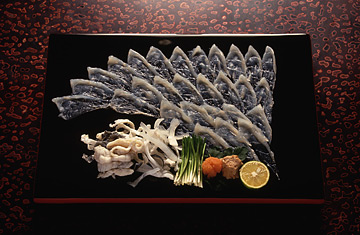
Display of Sashimi Fugu Blowfish
The event in question was the shinnenkai for Dentsu, the biggest independent advertising agency in Japan — and the world. Shinnenkai are parties that celebrate the New Year, the most important holiday on the Japanese calendar. They can be intimate affairs for family and friends, or, as in the case of Dentsu, they can be massive events involving the personnel, budget and planning required for a minor military campaign. Every significant corporation in Japan throws a shinnenkai for workers, clients and peers, but Dentsu's is beyond compare. Simply accommodating the more than 4,000 guests required that they attend in four shifts of two hours each. Dentsu wouldn't reveal the cost of Tuesday's event, but word on the floor was that over $400 had been spent for each guest.
As soon as they entered the Peacock Room — and maybe posed for a quick photograph with Dentsu CEO Takeo Mataki, who manned his position like a shopping mall Santa — it was straight to the food tables. There was the sushi counter catered by one of the finest restaurants in the capital. There was the grill manned by chefs who wielded steak knives like samurai. And there was the fugu — the poisonous blowfish delicacy that can cost your life if prepared incorrectly, and which can cost you $50 or more when ordered at a restaurant. I braved the fugu sashimi, cut in silicon-thin slices. It did not, as I expected, taste like death; it tasted more like record corporate earnings.
The pricey eats were an edible reminder that corporate Japan still has liquidity to burn. China's incredible growth may hog the headlines, but Japan is still the world's second-largest economy, and it's enjoying a resurgence. And the fact that this seems to have been forgotten by the world's first-largest economy remains a bit a sore point here. Or as one Diet member told me that day: "Hey! We're Number Two!" It's not that Japan wants a trade war again, but you know, it is nice to be noticed.
Even if the U.S. no longer genuflects to corporate Japan as it did in the 1980s, the black-suited gerontocracy still enjoys almost unquestioned influence at home. While you might have heard about the spiky-haired, anime-loving hipsters who are supposedly shaking up Japan, in truth most young people here still dream of joining the ranks of Sony or Canon or Toyota, just like Dad did. And why not? If you work hard enough — which is to say, put in 16-hour days for 30 years or so — you too could earn a place among the elite, eating fugu on the company dime. Being a salaryman is good, but being a salarymaster is better. And if you can't be one, the next best thing is to be on their guest list.
—With reporting by Michiko Toyama/Tokyo.
